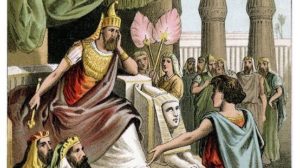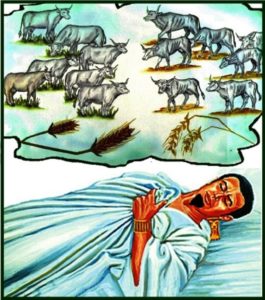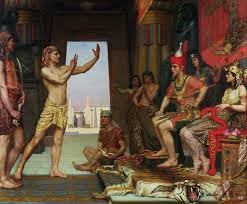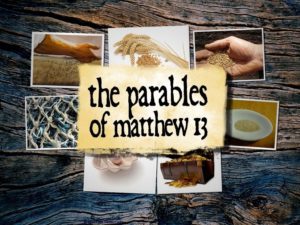TODAY’S READING IN THE OLD TESTAMENT: GENESIS 41:17 – 42:17
HAVE YOU EXPERIENCED FRUITFULNESS IN THE LAND OF YOUR AFFLICTION? 
After two years of being forgotten in prison, Joseph is finally recommended to interpret Pharaoh’s terrifying and mystifying dream. The cupbearer remembers how two years earlier Joseph interpreted his dream and it was fulfilled with pinpoint accuracy. This reminds us of the importance of being faithful to use the gifts that God has given us when we have the opportunity, while remaining patient.
Proverbs 18:16 reminds us:
“A man’s gift makes room for him and brings him before great men.”
But Joseph wasn’t fighting for a big break, for promotions, greater power, greater influence, or an exalted position. He was not living for the recognition or applause of great men. He lived for the greater glory and honor of God. It seems that whenever he is given an opportunity, he makes a bee line to give glory to God.
Notice Joseph’s attitude of humility. When Pharaoh mentions that he has heard Joseph has the ability to interpret a dream once he hears it, Joseph responds saying, “I cannot do it, but God will give Pharaoh the answer he desires.”
When Joseph hears Pharaoh’s dream, Joseph begins his interpretation by saying, “God has revealed to Pharaoh what He is about to do” (Gen 41:25, 28). 
Pharaoh recognizes not only that Joseph has a genuine gift for interpreting dreams that predicted what “God was about to do” (verse 25) but that he had the wisdom to know what Pharaoh should do (verse 34).
Joseph proposes that a fifth of each year’s crops be set aside during the predicted seven years of abundant harvests, in order that there be an abundant supply reserved for the predicted seven years of famine. When Joseph suggests that someone be appointed to administer the project, Pharaoh responds by saying to those assembled, “who could do it better than Joseph? For he is a man who is obviously filled with the spirit of God.” (Gen 41:38)
Wouldn’t it be wonderful if that could be said about each one of us?
May we be known for our exemplary heart attitudes. May we be known as those who think with God’s thoughts. May we be known as those who make decisions with God’s wisdom directing our wills. May we be known for our faithful stewardship of the gifts God has given us. May we be known as those who are “obviously filled with the spirit of God”!
Joseph was sold into slavery when he was 17 and now, at 30, he is promoted to the highest position in Egypt next to Pharaoh himself. He has been maintaining his track record of being faithful and disciplined. He exercises wisdom and develops his skills daily. And he gives God the glory for his successes.
Pharaoh gives Joseph the name “Zaphenath-Paneah” (‘the revealer of secrets’). Then Joseph, like his ancestors, Isaac and Jacob, receives his bride in a far country. (This also prefigures the Messiah coming to us who live far from the Throne of God in heaven, and taking those who believe to be His bride, His church, and reign with Him as His eternal companion.)
During the seven years of plenty that follow his exaltation, Joseph becomes the father of two sons by Asenath. Their names reflect the deep inner victory that God gave Joseph during the 13 years of hardship in Egypt- ‘Manasseh’, meaning “It is because God has made me forget all my trouble and all my father’s household”, and ‘Ephraim’, meaning “God has made me fruitful in the land of my affliction.” Again, Joseph was testifying and glorifying what God had done on his behalf.
God was at work in Joseph’s heart causing him to gain perspective. Joseph did not forget his family or the evil deeds of his brothers, but he was able to let go of the pain and suffering that they had caused him. He was able to forgive. He knew that although his brothers meant it for evil, God was using it for the good (Gen 50:20). We too can have victory over bad memories and past hurts by affirming the love of God shown to us in the cross of Jesus Christ. We must let the love of God in Christ become our frame. Jesus provided God’s righteous answer to the wrongs we committed and suffered. When we recognize God’s mercy shown to us in the cross, we can let go of our role as vindicators. We can be thankful that God is at work and uses all of these situations for the good of His purposes (Romans 8:28).
Ephesians 4:31-32 31 Let all bitterness and wrath and anger and clamor and slander be put away from you, along with all malice. 32 Be kind to one another, tender-hearted, forgiving each other, just as God in Christ also has forgiven you.”
Romans 12:19 19 Never take your own revenge, beloved, but leave room for the wrath of God, for it is written, “VENGEANCE IS MINE, I WILL REPAY,” says the Lord.
Joseph was able to focus on every kindness and mercy God had shown him. “He has made me fruitful in the land of my affliction.” Can you say that about the areas of hurt in your life?
Ephraim means ‘double fruitful’. Yes, Joseph had two sons in Egypt, but he also was blessed with a life with God that flourished with abundance. The Hebrew root of Ephraim is ‘apher’ meaning ‘a bandage, or covering.’ God graciously and progressively brought healing to Joseph’s wounds.
What a great combination to have in our families: “forgetfulness” and “fruitfulness”. Forgetting what is behind (forsaking the hurts of the past) we can rejoice in God’s mercy in the present, and know that we can press on towards the future with hope. God is in control and has a plan to work all things together for the good of those who love Him and are called by Him. (Philippians 3:13; Romans 8:28)
During the time of famine in the Middle East, Joseph’s brothers came to Egypt for help. Joseph demonstrates a heavenly wisdom in the way he masterfully brings his brothers to repentance, and a new family relationship of love and forgiveness.
NEW TESTAMENT READING: Matthew 13:24-46
Parables are earthly stories that illustrate and illuminate spiritual realities. They function as windows to the truths that Jesus taught. To some, the meaning of the illustration will be clear and let the light in. To others, the meaning will be obscured and keep the light out.
Jesus describes his parables as having a twofold purpose, fulfilling the prophecy of Isaiah:
Matthew 13:13-16 (NASB)
13 “Therefore I speak to them in parables; because while seeing they do not see, and while hearing they do not hear, nor do they understand. 14 In their case the prophecy of Isaiah is being fulfilled, which says,
‘YOU WILL KEEP ON HEARING, BUT WILL NOT UNDERSTAND; YOU WILL KEEP ON SEEING, BUT WILL NOT PERCEIVE; 15 FOR THE HEART OF THIS PEOPLE HAS BECOME DULL, WITH THEIR EARS THEY SCARCELY HEAR, AND THEY HAVE CLOSED THEIR EYES, OTHERWISE THEY WOULD SEE WITH THEIR EYES, HEAR WITH THEIR EARS, AND UNDERSTAND WITH THEIR HEART AND RETURN, AND I WOULD HEAL THEM.’
16 “But blessed are your eyes, because they see; and your ears, because they hear.”
T o some, the parables would reveal the truth about the Divine operations of the kingdom of God. To others, they would conceal the truth. Jesus deliberately spoke in parables so some people would ‘get it’ and some people would not ‘get it’. Those who were given understanding would put their trust in Jesus and come into the healed relationship with God that the gospel offers.
The Jewish people had their own ideas about the kingdom. Those who looked for a Messiah who would deliver the people of Israel from their Roman oppressors were disappointed with Jesus.
Jesus explained that the kingdom of God would not come with a political revolt. It would come through the Word of God bringing a new life through the Spirit to the hearer’s heart.
What Jesus made clear about the kingdom of God from the first parable of the Sower, the Seed and the Soils, is that not everyone who hears the Word gets saved. Only the hearer who humbly receives it, submits to it, and allows its life to be reproduced within them, will manifest their kingdom citizenship. Genuine trust in God’s Word cannot be superficial. It cannot be abandoned in times of trial or choked by the deceitful distractions, idolatries and cares of this life. The kingdom of God is about the life and the rule of the King being reproduced in the hearts of its subjects.
In the second parable Jesus speaks of the wheat and the tares growing up together. Jesus sows the true wheat. Satan sows the tares. There will be true believers and false believers growing up together in the visible church. Only in the final day will the difference between wheat and tares be fully discernible. Jesus will separate the wheat from the chaff at the appointed time of judgment. The wheat will be gathered with Christ. The tares will be cast into the fire. The point is that there will be mixture in the church during the season of growth. Each one should examine themselves to be sure that they are in Christ and Christ is in them (2 Corinthians 13:5; 2 Peter 1:10).
The third parable, the mustard seed parable, shows the impact that the gospel will have in society during this age between Christ’s resurrection and His return. Christianity will provide shelter for many birds to nest in its branches. In other words, individuals and civilizations will benefit from the effects of the gospel. They will find a haven in the core values, heritage, and institutions of Christianity without being a part of the tree. We are not to mistake people benefiting from the shade of the kingdom as being part of the kingdom itself.
The fourth parable is the illustration of the woman who is working leaven into a lump of dough and baking bread. In this case the leaven represents the rule of God in the kingdom that is buried in the dough of the world. The leaven penetrates and permeates every area of dough. So does the influence of Christ in the life of the believer.
The fifth parable is the treasure hidden in the field. The treasure is the kingdom– all that is offered to us in Christ. A man stumbles upon the treasure, perhaps by working in the field. Rather than stealing the treasure, he hides it again and legally purchases the field that the treasure might be rightfully his. He realizes that the treasure is worth all that he possesses. He joyfully sells all that he has that he might buy the field and acquire the treasure. Some will stumble upon the gospel and will have the sense to esteem it as their greatest treasure, forsaking all to possess it. The extravagant investment seems foolish to outside observers. They think the man is paying too much. The man knows that he is getting what he could never deserve, or earn. He is getting the greatest bargain. In the words of C.T. Studd, “If Jesus Christ is God and died for me, no sacrifice can be too great for me to make for Him.”
The sixth parable is the merchant who is seeking precious pearls. This man knows what he is looking for. When he discovers this pearl of supreme value, he goes and sells all that he has to buy the pearl. There is nothing that compares with the beauty of what is offered to us in Christ, the King of Kings. He is the pearl of great price. Some people will spend a great deal of time searching for the truth before they find it in Christ. But when they find it, they recognize that their search is over and act accordingly. When they finally discern the value of the gospel, they will gladly exhaust themselves for His kingdom.
The seventh parable in Matthew 13 is the dragnet cast into the sea that gathers fish of every kind. All those who have ever fished with a net know that you often have the bad hauled in with the good and the catch needs to be sorted out. “So it will be at the end of the age”. Jesus interprets these parables that we might have an understanding of the times in which we live.
What are the lessons? Now is the time to liberally sow the seed (the Word of God) throughout God’s field, the world. We will continually face the opposition and counterfeiting works of the evil one. We are to persevere in loving the unlovely, disciplining the unruly, and being patient with all, because the Lord of the harvest knows what He is doing, and in His time He will sort out the true believers from the false. The day is not over. Keep on keeping on and leave the judgment to God. Let others come under the shade of the gospel’s influence, but make the gospel clear so that those whom God has appointed to eternal life will be converted (Acts 13:48). Be generous in extending the good of the gospel. Some will stumble upon it. Like C.S. Lewis, their conversion will be a sudden event of being “surprised by joy” (the title of Lewis’s autobiography). Others, like the merchant man, discover the gospel after a long hard search, but in the end, it is God who opens their eyes to discern the gospel’s worth. Be patient with all, do your part, recognizing God will sort out the gospel catch in the end.
TODAY’S READING IN THE BOOK OF PSALMS- Psalm 18:1-15
Psalm 18 is a song of deliverance that is found also in 2 Samuel 22:1-51, with significant variations. The opening words mark the theme of gratitude.
Psalm 18:1 1 “I love You, O LORD, my strength.”
He follows this clear declaration of love with a reflection on Who God is as His strength, Rock, fortress, deliverer, refuge, shield, horn, stronghold and Redeemer.
Then he thanks the Lord for what He has done –saved him from his enemies, delivered him from fear and death itself (18:4-5).
In verse 6 he testifies of answered prayer. Then he describes the Lord’s power in judgment (18:7-15). Who can stand in the Day of Judgment? Only those who are rescued (verses 16-19). Who are rescued? Those who are rewarded through their righteousness. In the context of the revelation of Scripture, this must refer to the righteousness of Christ that is credited to those who believe God’s gospel. Who else could state verses 20 to 24 with integrity but Jesus Christ? (This revelation unfolds more clearly as we study the rest of Psalm 18 in our future readings).
TODAYS READING IN THE BOOK OF PROVERBS: Proverbs 4:1-6
Proverbs 4:1-6 1 Hear, O sons, the instruction of a father, and give attention that you may gain understanding, 2 For I give you sound teaching; Do not abandon my instruction. 3 When I was a son to my father, tender and the only son in the sight of my mother, 4 Then he taught me and said to me, “Let your heart hold fast my words; Keep my commandments and live; 5 Acquire wisdom! Acquire understanding! Do not forget nor turn away from the words of my mouth. 6 “Do not forsake her, and she will guard you; Love her, and she will watch over you.
What is your relationship to the Word of God?
PRAYER: Father, thank You for the gift of our salvation. Thank You for forgiving our sins on the basis of Jesus fulfilling the righteous demands of Your holy law on our behalf. Thank You for clothing us who believe with His righteousness. We esteem the gift of eternal life in Christ as our greatest treasure. Help us to spend our lives with abandonment, discerning the pearl of great price, the treasure in the field, the powerful leaven of His life. Like Joseph, help us to be faithful in the exercise of the particular gifts, talents and opportunities that You give, trusting in Your perfect timing, and the wisdom of Your redemptive plan. In Jesus’ Name. Amen.
Pastor David
